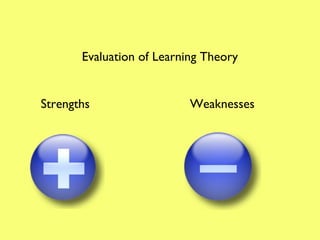Learning theory explanation of attachment
•Download as PPT, PDF•
4 likes•24,760 views
Report
Share
Report
Share

Recommended
More Related Content
What's hot
What's hot (20)
Classical conditioning vs operant conditioning (2)

Classical conditioning vs operant conditioning (2)
Psychology: Harlow’s experiments on attachment in monkeys. by Janice Fung.

Psychology: Harlow’s experiments on attachment in monkeys. by Janice Fung.
Similar to Learning theory explanation of attachment
Similar to Learning theory explanation of attachment (20)
AQA Psychology A Level Revision Cards - Attachment Topic

AQA Psychology A Level Revision Cards - Attachment Topic
Attachment Theory And Psychoanalysis A Rapprochement

Attachment Theory And Psychoanalysis A Rapprochement
In Humans and Animals, Social Learning Drives Intelligence

In Humans and Animals, Social Learning Drives Intelligence
Summary chapter 1 of psychology of language teachers [updated]![Summary chapter 1 of psychology of language teachers [updated]](data:image/gif;base64,R0lGODlhAQABAIAAAAAAAP///yH5BAEAAAAALAAAAAABAAEAAAIBRAA7)
![Summary chapter 1 of psychology of language teachers [updated]](data:image/gif;base64,R0lGODlhAQABAIAAAAAAAP///yH5BAEAAAAALAAAAAABAAEAAAIBRAA7)
Summary chapter 1 of psychology of language teachers [updated]
All about evolutionary psychology and its functions

All about evolutionary psychology and its functions
Animal Models from The Concise Corsini Encyclopedia of Ps.docx

Animal Models from The Concise Corsini Encyclopedia of Ps.docx
More from mpape
More from mpape (20)
Learning theory explanation of attachment
- 1. Evaluation of Learning Theory Strengths Weaknesses
- 2. There is a lot of evidence that animals learn through classical and operant conditioning Pavlov demonstrated learning through classical conditioning
- 3. Skinner demonstrated learning through operant conditioning Psychologists continue to demonstrate that all animals learn through classical and operant conditioning
- 4. However, the evidence for learning theory is mainly based on experiments with non-human participants. Animals may be similar to human beings in the way they learn but we have far more complex brains and a highly developed cerebral cortex.
- 5. Emotions may play a far more important role in human cognition and attachment formation. Conclusions about human attachment based on animal studies may not be valid.
- 7. Even if we accept that learning is important for human attachment food may not be the primary reinforcer. Attention, care, responsiveness, and comfort, may be the main rewards and these rather than food create the attachment bond.
- 8. Hary Harlow (1959) “ The Origins of Love Experiments”
- 9. Text Schaffer & Emerson (1964) ‘ The Glasgow Baby study’
- 10. AO1: Psychological Knowledge AO2: Analysis and Evaluation The extended writing question